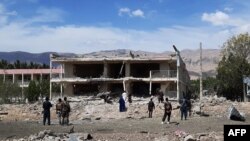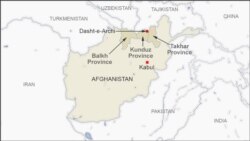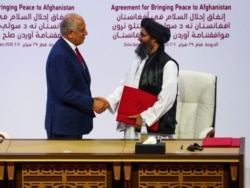Two Taliban attacks in northern Afghanistan’s Kunduz province early Monday killed at least eight Afghan security personnel and wounded multiple others, according to provincial authorities.
Esmatullah Muradi, a spokesman for the provincial governor, told VOA the militants launched their attacks on security outposts soon after midnight and fighting continued overnight. He said 13 Taliban militants were also killed in the fighting in Shinwari village near the provincial center.
In a tweet, Taliban spokesman Zabihullah Mujahid confirmed the attacks and said that nine Afghan security personnel were killed. He also said a Humvee was destroyed and its crew killed as they were on their way to provide reinforcements to Afghan forces.
Meanwhile, in neighboring Baghlan province, a general sense of insecurity has increased over the last few weeks with locals reporting illegal Taliban checkpoints on Kabul-Mazar-e-Sharif highway between Baghlan and Mazar-e-Sharif.
The militant attacks continue at a time when the Afghan government is under pressure to facilitate the start of negotiations with the Taliban as soon as possible.
“We urge this country’s leaders promptly to establish the new government, create the High Council for National Reconciliation, complete the exchange of prisoners, and move to the opening of intra-Afghan negotiations,” tweeted the U.S. charge d’ affaires, Ross Wilson, Sunday.
The Afghan government has blamed the Taliban for the delay in negotiations that were supposed to start in March but have been stalled several times.
Najia Anwari, a spokesperson for the Ministry of Peace, said the government was taking into consideration the existing laws of the country while releasing Taliban prisoners.
The release of up to 5,000 prisoners, in return for up to 1,000 Afghan security personnel, was the biggest hurdle for the start of talks with the insurgents. The government has released 4,400 prisoners but refuses to release the last batch, calling them dangerous and involved in bloody attacks. Instead, it has asked the Taliban for an alternative list of names — a demand the militant group has rejected.
The prisoner exchange was agreed upon in a deal between the United States and the Taliban which was signed in February in an effort to help end the decadeslong conflict in Afghanistan. The Afghan government, which was not part of that deal, has resisted releasing Taliban prisoners from the beginning without the militant group announcing a cease-fire.
Still, Afghanistan’s special representative for Pakistan, Muhammad Omer Daudzai, told VOA’s Urdu service the intra-Afghan negotiations could start in weeks.







